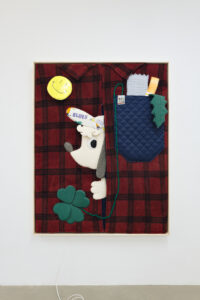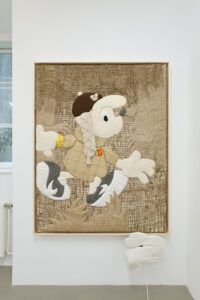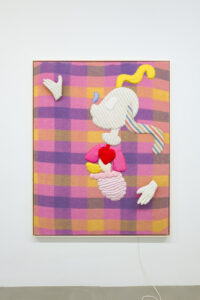
Wonnerth Dejaco Gallery is proud to present FOR YOU, the second solo exhibition of Daniel Ferstl (Linz, 1982).
Less than two decades ago, Times magazine chose YOU as its person of the year. The famous cover was dedicated to all those who were feeding an increasingly ravenous world wide web with their anonymous and solitary content.
We were moving toward the tyrant Ego, as Eric Sadin calls the current social media era, in which limitless expressiveness and self-exaltation constantly need immediate feedback.[1] Isolated beings, unable to even conceive of a common project, we feed an endless delusion of omnipotence to mask our, more or less substantial, irrelevance. We ride a meteor falling at great speed. Noting this chasm, a kind of collective psychosis in which each individual I competes to show others their fictitious and carefree self, Daniel Ferstl offers us an oasis, a refuge where we can refresh ourselves at least for a while, indulging in the sensuality of canvases and colors that envelop us.
‘Passive Progressive’ is a collage of textiles, some in relief, that Ferstl composes with painterly sensitivity. In the fabrics used for the backgrounds we recognize clear references to Richter’s style, but also to Polke, while several forms, perhaps flowers, in acid tones, float like Monet’s water lilies. Daniel Ferstl’s works come across as pleasantly superficial. We immerse ourselves in lysergic textures, feeling strangely at ease as we move from one to the next, gliding through the wide range of textiles that enrich the polyphony of this exhibition. The artist sews stylized figures onto a carefully chosen background. He manages to evoke the pleasant sensation of touching textile surfaces, as if on the couch at home or in a boutique (more Westwood than Valentino) where we would happily spend the afternoon, drinking and jeering.
In his paintings, there is no painting; they are sophisticated, almost narrative, often iconic compositions. Surfaces to be traversed with a tactile gaze. Over the cute little dogs that pop up here and there, provoking instant tenderness (it’s true, they work a bit like cats and other pets on social media…). But most of all for the patchworks of the magnificent fabrics that Daniel Ferstl offers, sometimes padded, sometimes moving, delightful to look at up close to the point of touching them, perhaps to wear or to lay on them, hugging them.
I get the impression that the artist wants to take care of the viewer; yes, even you. The title of the exhibition seems to hint at this intention. But can we trust it? Not too much, just a little bit. After all, an oasis is only a brief interlude in the middle of the desert. We cannot live lying on the couch of a boutique. Too much aesthetics can, quite literally, consume us, as indeed happens in Posh Doggo Skeleton.
But that’s not true! Everything is for you, it’s made just for you!!! We are conveniently awaiting you. The World is Yours [The World is Yours]… one read at the end of “Scarface” when everybody dies in a sea of blood in which the protagonist’s dream of glory drowns as well. In his own delusion of grandeur, abundantly narcotized, he was the greatest and had attained the throne… In Brian de Palma’s film, shot in Miami, the clothing, with those garish fabrics, is vaguely reminiscent of the scraps of cloth that Daniel Ferstl patiently selected in his long research at Textil Müller, seemingly influenced at the same time by a Bollywood B-movie and the Prince of Wales. What you have been feeding, day after day, comes back in the form of surveillance, but don’t worry, the algorithm assures you that it will fit. The extraordinary offer is for you. Just for you.
The title of another Ferstl painting reads, “Imacramee / I want adventure in the great wide open I want it more than I can tell and for once it might be grand to have someone understand I want so much more than they’ve got planned.” An elegant little doggy moves among fine beige fabrics, in search of a companion made just for them. The tyrant I always demands what it deserves, right?
The anxiety caused by relentless surveillance, or the terror of not receiving deserved feedback, is the price we pay for over-connection and seemingly infinite contact. There is a lack of selfless and supportive sharing, a lack, above all, of the pleasure of touch (unless we are content to brush a screen with thumb and forefinger as we glide from one veil to another, through layers that never end). The cute little dog peeking out of a plaid shirt is threatened by the ubiquitous brands; shimmering, alluring colors and lots of design in exciting reminders of glittery shopping. Stanley Cup, Prime Hydration or Takis (this is not the kinetic artist) are registered brands, products whose powerful visual appearance interests the artist.
Do we choose products without knowing why? Do Taylor Swift fans who wear the jersey of Travis Kelce, her boyfriend and football star, do so out of solidarity with the pop star? Or out of a need to identify completely with their object of desire, an indomitable desire to participate in the spectacle? In a world where everything is spectacle, the worst thing is to be excluded from it.
“[…] we have evolved into a society of applied statistics through which an algorithm can change its program as it goes along in order to make smart devices help us.”[2] Everything is for you, precisely, exactly for you.
We also find a series of accessories, desirable objects of this universe woven for us by Daniel Ferstl: bags and hats await the viewer. They can be worn, thus following the advice of our favorite little dog who would never leave the house without his watch. Ferstl’s works envelop us and relieve us a bit of the need to appear, transporting us from appearance to the surface, which is not the same thing.
At last we can touch, rest our anxious minds, find our bodies, make our eyes rejoice as we feel the textile surfaces. A small motor hypnotically turns a hand, a smiley, a flower. They lull us for a while, toward a dream less delirious than Scarface’s, definitely more pleasant.
Francesco Giaveri (translated from the Italian)
[1] Tancredi Bendicenti, “Io Tiranno” di Éric Sadin, Pandora Rivista, https://www.pandorarivista.it/articoli/io-tiranno-di-eric-sadin/
[2] Carolyn Christov-Bakargiev, Hito Steyerl – They Are Oblivious to the Violence of Their Acts. Windows, Screens and Pictorial Gestures in Troubled Times, https://www.castellodirivoli.org/hito-steyerl-carolyn-christov-bakargiev/























